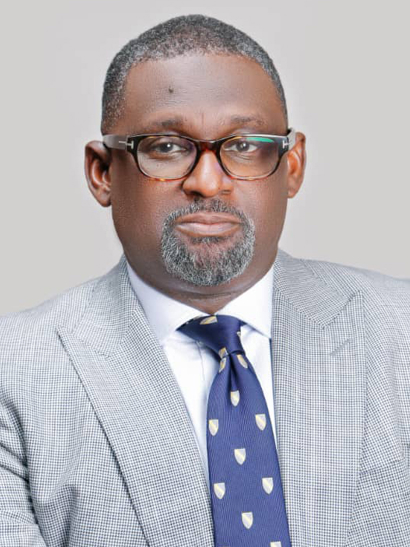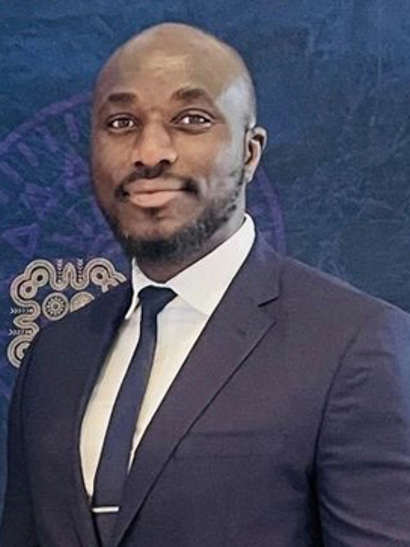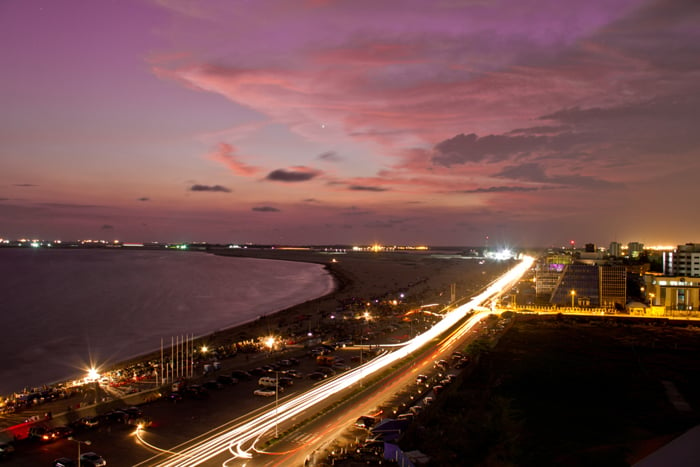Nigeria holds huge reserves of the world’s oil and gas but getting that to global markets relies on significant maritime infrastructure. According to OPEC data published in 2023, the country ranks 10th in the world in terms of proven crude oil reserves and eighth for its natural gas reserves and production is increasingly moving offshore, for which support services are increasingly needed.
Much of that is locally operated – such as indigenous oil companies, tugs and other offshore support vessel operators – which is beyond the remit of IMO’s international conventions and requirements, but some of the region’s international players would like to see them embrace those standards and are hopeful that the country’s apex maritime institution will incorporate them into its domestic requirements.

In this article, one of those players and LR's representative in Africa have discussed these ambitions: Abdulkadir Ahmed, CEO of NLNG Shipping and Marine Services Limited (NSML) and Ngozi Gwam, LR Senior Representative for Africa and Country Director for Nigeria.
They both reflected on industry discussions which took place in July this year. Sponsored by NSML, it was one of the first industry crossover engagements between maritime and oil and gas stakeholders and was facilitated by LR. It took place alongside the annual Nigeria Oil & Gas (NOG) Energy Week Conference, which attracts more than 7,000 attendees.
Ahmed recalled his initiative to set up the discussion, saying that the oil and gas sector was increasingly focusing on offshore activities, yet there was no platform within the event to address the significance of this trend.
Ahmed recalled his initiative to set up the discussion, saying that the oil and gas sector was increasingly focusing on offshore activities, yet there was no platform within the event to address the significance of this trend.
It brought together – for the first time – about a dozen industry stakeholders on the maritime side of the industry to explore the interdependence between the oil and gas industry, shipping and the rapidly evolving regulatory landscape. The aim, Gwam said, was to have an open discussion with industry stakeholders from the operators to regulators to understand how they were addressing the emerging maritime regulatory landscape.
Ahmed identified two important outcomes from the meeting. One centred around standards and the other around regulations. NSML, of course, adheres to international standards since it operates internationally and NLNG is 51%-owned by non-Nigerian energy companies, but there is no domestic ‘Nigerian standard’ as far as shipping is concerned. The question is, what should domestic standards be based on?
The same goes for regulation: the meeting discussed such things as the emerging regulations on greenhouse gas emissions and decarbonisation, but whether these could be applied locally prompted a spectrum of views. At one end, there were those who argued that there are more pressing issues such as the economics and profitability of the operating environment due to sometimes overlapping regulatory fees, while at the other were voices – such as NSML’s – making the case that whilst they agreed that there are challenges in the local operating environment, global issues cannot be ignored.

Positive outcomes
Despite the acknowledged challenges, the outcomes from the meeting were positive overall. There were no objections from participants to following international regulations, Gwam said, although they felt that individual local operators could adopt them voluntarily unless they were incorporated into local regulations before they would be mandatory to every operator.
And the regulators are on the case. The country already has an energy transition plan, which was announced shortly after the country’s previous president, Muhammadu Buhari, made a commitment to carbon neutrality by 2060 during COP26 in late 2021. A Climate Change Act that year set the stage for a National Council on Climate Change that was established in September 2022, with a broad remit to formulate appropriate policies to achieve “green growth and sustainable economic development for Nigeria.”
In addition, the Nigerian Upstream Petroleum Regulatory Commission (NUPRC) has set up an Energy Transition and Carbon Monetisation Department and Gwam has met two members of its team – one of whom had been an LR-Chevening Scholar and had served as an intern at LR Foundation’s Maritime Decarbonisation Hub – Hajara Kabeer, before returning to Nigeria to join NUPRC.
With those initiatives in mind, Gwam described the country’s regulators as forward-thinking and noted that the country had signed up to most of the international requirements so believes that local shipping regulations will be brought into line with those global requirements in a structured, measured and balanced way.
Ahmed notes that Nigeria “does not operate in isolation” and that many factors are at play that could influence the government’s final position. He is, however, also confident that Nigeria will adopt international requirements. He points to the nation’s own 2060 goal, which he described as being not just a target; “it’s also a commitment to do something”. He also commended the Nigerian Maritime Administration and Safety Agency (NIMASA) for its role as Nigeria’s signatory to IMO conventions, saying that it “recognises the need to domesticate those regulations into local laws and drive compliance.”
Getting this done will require collaboration between the regulator and operators. It will not be enough simply for domestic regulations to be amended, “it requires the industry to take ownership to drive compliance,” Ahmed said. Gwam agrees, saying that the local regulations will not be changed unless there is a clear reason to do so, which must be based on engagement with local stakeholders, “because, ultimately, the economy of the country will be put first”.
Following the engagement at NOG, industry representatives are also planning to develop proposals based on the points made during that discussion. A working group is to be formed to produce recommendations by the end of this year that can be put to both industry and regulators in the early part of 2025 and taken forward to a follow-up discussion during next year’s NOG event.

Benefits and costs
Although there might be reluctance among some local operators to adopt international rules and standards, Ahmed believes they will see benefits from doing so. If they do business with international oil companies (IOCs), for example, they might find that those IOCs require compliance with global standards, so those local companies that do so will have a competitive advantage.
It will also give local operators an opportunity to grow and become international players, “and you’ve got to start somewhere,” he said.
But nothing comes free of charge. The major players in the African oil and gas sector are IOCs that must adhere to global regulations and therefore require their local contractors and partners also to adhere to them, Ahmed noted. “That creates its own challenges for players in the shipping and maritime space in Africa [because] the cost of compliance is quite high, whether it's an investment in new equipment or retrofitting.”
For example, if a local operator wanted to voluntarily reduce its GHG or carbon emissions, it would probably have to upgrade or even replace its vessels. Local infrastructure to support, for example, alternative fuels might also require significant investment to adapt or build new infrastructure, Gwam noted, so the cost of aligning local operations with international standards cannot be ignored.
In addition, there is the risk of job losses, Ahmed commented, since upgraded technology will almost certainly require upskilling, which requires additional training and development, which will also have associated costs.
Ultimately Ahmed believes that “it requires both sectors – maritime and oil and gas – to come together and find and drive a solution”.
Buzz sounds across sub-Saharan Africa
“Sub-Saharan Africa is buzzing”, said Richard de Vries, LR's Dubai-based Vice President of Business Development for the Middle East & Africa and India, in June and Goz Gwam hears that buzz clearly.
Gwam describes an interdependency in the region between its oil and gas and maritime sectors, saying that they work “hand-in-hand” and although he is based in Lagos, Nigeria, which is one of LR’s major hubs in Africa, he has oversight of the business in West Africa, South Africa, Kenya, Tanzania, Mozambique, Angola and Namibia.
But one of his biggest clients is linked to Nigeria LNG Limited (NLNG), which has 23 LNG vessels on charter to deliver its LNG to global customers and an LPG carrier for its domestic market. NLNG Shipping and Marine Services Limited (NSML) manages 11 of those LNG vessels – which include four dual-fuel diesel electric vessels owned by Bonny Gas Transport – and provides other services, including crew management, terminal management and training services via the Maritime Centre of Excellence.
Nigeria’s oil and gas industry is older and more mature than others in the region and the country is taking a serious interest in decarbonisation, Gwam said, especially as international regulations place increasing emphasis on environmental controls. “It's all about creating a balance [and taking account of] the economic impact of putting these things in place,” and Nigerian oil industry operators “know that something has to be done on the decarbonisation front,” he said.
As mentioned above, NLNG is leading the charge on this front and has set itself a decarbonisation target of 2040 – which is a decade ahead of IMO’s 2050 goal.
But while NSML focuses on LNG as a means of reducing its vessel emissions there is a general acceptance that LNG is a transitional fuel towards a totally green energy environment, Gwam said. Nonetheless, there is a “general awareness and movement towards decarbonisation in Nigeria and sub-Saharan Africa and actions are being taken,” Gwam said. “What matters now is the speed of adoption.”







